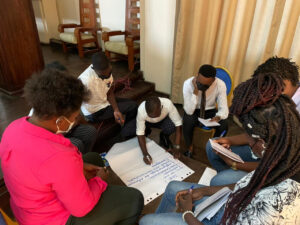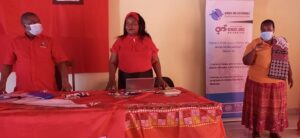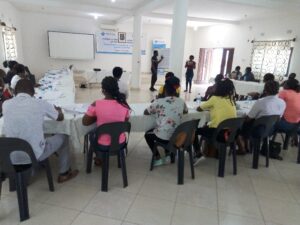Project
Raising the Social and Political Profile of Youth in Mozambique
- Women's empowerment
- Mozambique
- April 2024
The project supports young people’s participation in local and national issues by developing youth councils and youth councilor training workshops. Young people will have their voices heard on key social and political platforms, and will be better represented at the center of local and national policies and decision-making, within and outside selected councils. Project activities incorporate actions in response to the Covid-19 crisis as it impacts youth.
Lessons from Project
- Women's empowerment
- Mozambique
- April 2024
The project has highlighted the receptiveness of municipal governance structures to the voices of young people. It is, therefore, opportune to invest in initiatives that actively incorporate youth perspectives into the development of public policies concerning youth affairs.
- Women's empowerment
- Mozambique
- April 2024
Clear communication with project stakeholders is essential to foster effective collaboration and mitigate potential misunderstandings or disputes. This should include a clear description of their roles and responsibilities, benefits, and timelines. In this project, discrepancies in the beneficiary selection and external consultant management would have been improved if all the stakeholders had received and signed specific Terms of Reference (ToR) outlining their duties, responsibilities, compensation, expected deliverables, and timeline.
- Women's empowerment
- Mozambique
- April 2024
Community radio debates have proven to be a powerful tool for amplifying the voices of youth within social and political spheres. In this project, radio debates, led by project beneficiaries, drew significant audience engagement, as indicated by the influx of phone calls received during broadcasts. This interaction facilitated meaningful dialogue among youth and boosted the self-confidence of project beneficiaries.

- Women's empowerment
- Mozambique
- April 2024
Integrating project activities with existing municipality initiatives involving youth has proven to be a successful strategy for ensuring project sustainability. In addition to creating new dialogue spaces between municipal authorities and youth, this project leveraged existing platforms, such as annual meetings with the local councilors, to include youth consultation in the municipal annual activity plans. This approach fostered stronger youth participation following the project capacity-building activities.
- Women's empowerment
- Mozambique
- April 2024
The challenges posed by an unexpected event, such as the COVID-19 pandemic, underscored the importance of fostering strong connections with project stakeholders, adaptability, and proactive engagement. In this case, faced with a lockdown and the inability to conduct planned activities, the project successfully maintained its course, sustained stakeholder engagement, and capitalized on unforeseen opportunities to achieve enhanced outcomes.
- Women's empowerment
- Mozambique
- April 2024
The inclusion of political parties in the development and planning of activities during the project design phase could have further enriched the initiative’s relevance and ensured a broader and more inclusive platform for youth participation in Mozambique’s democratic development processes. In this project, specific activities aimed at encouraging youth involvement in political parties resulted in eighty-nine percent of the project beneficiaries registering with political parties. However, the potential for even greater youth involvement in political activities could have been realized by involving political party representatives in the design of tailored activities to promote active participation and enhance engagement in party-related initiatives.

- Women's empowerment
- Mozambique
- April 2024
The project experience revealed that regular follow-up with project partners to monitor key activities, such as beneficiary selection, ensures accountability and maintains alignment with project goals and objectives. In this case, the project focal points across the provinces undertook the task of beneficiary selection without the consistent guidance and follow-up from the grantee. This led to the adoption of diverse selection criteria, some of which inadvertently contributed to higher participant turnover rates.
